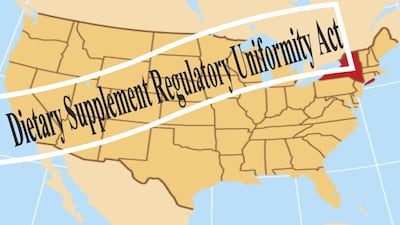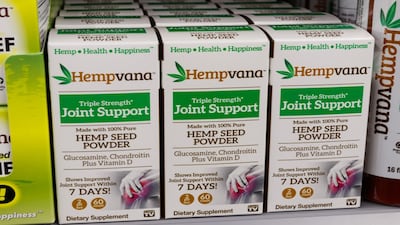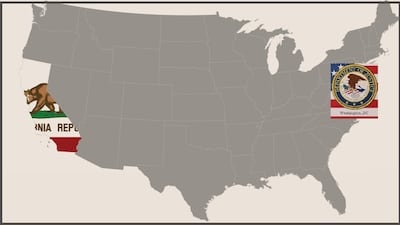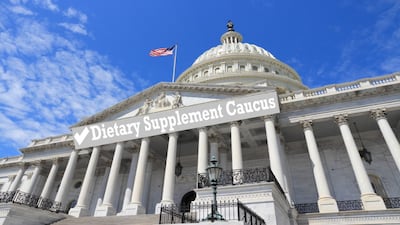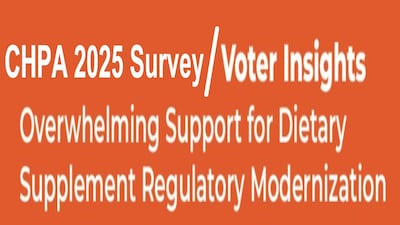Legislation
“Dietary Supplement Regulatory Uniformity Act” would prohibit states from adding requirements and rules for supplement manufacturing and sales on top of FDA regulations.
Hawaii proposes age-restricted sales but, unlike similar bills also filed in Alaska, Massachusetts, Michigan and Washington legislatures, would require behind-the-counter storage to limit consumer access in stores.
CRN’s support, a pivot from qualified backing for the previous bill, came after the senator added language to relieve firms of some responsibility around providing all claims for their products to FDA to include public-facing list.
Lawmakers in IL, MA and NJ as well as MI consider proposals as firms marketing weight loss and bodybuilding supplements in New York already are subject to first-ever state law limiting sales of products to consumers 18 and older.
Regardless of THC level and even though the US hemp product marketplace is growing, FDA regulations prohibit the botanical’s use as a dietary ingredient or food additive because it’s been studied or approved for use as a drug in the US.
Provision supported by Sen. Mitch McConnell, R-KY, along with House Appropriations Committee chair Andy Harris, R-MD, tightens definition of lawful hemp to exclude any THC derivative from cannabis at more than 0.3% concentration by dry weight and specifically exclude synthetics.
But the Senate’s reduction would not be as much as the House of Representatives and President Trump proposed earlier this year, which is likely a win for the agency.
State and territory attorneys general urge congressional leaders to clarify definition of hemp, which they say “bad actors have exploited due to a perceived loophole” of 0.3% delta-9 THC level stated in 2018 farm bill de-scheduling as controlled substances some ingredients extracted from cannabis.
Trade group tells DoJ about complaint against New York law age-restricting sales of supplements containing ingredients labeled or promoted for weight loss and bodybuilding. Compliant manufacturers adhere to federal safety standards for heavy-metal content, but California regulation could incentivize
Internal Revenue Code should include within its definition of “medical care” spending the consumers' purchases of supplement products based on labeling of FDA-approved health and structure/function claims, NPA CEO Daniel Fabricant says.
What's going on with the EU Green Claims Directive? HBW Insight speaks to the European Commission, Parliament and Council to find out why trilogue negotiations seem to have stalled.
Dietary Supplement Caucus e-launched the 119th Congress with Utah Republican House member Mike Kennedy and Texas Democrat member Marc Veasey as co-chairs and with a total of nine senators and 20 House members spanning both parties.
Provisions in bill approved by Agriculture, Rural Development, FDA and Related Agencies Subcommittee aren’t likely to pass largely because they set a price too high for delta-8 THC and other ingredients to meet the definition of hemp as a de-scheduled substance.
A US House bill would give the FDA $33.1m more in budget authority than requested by the Trump Administration for fiscal year 2026. The measure was sent to the full House Appropriations committee on a party-line vote.
Results of survey found a majority of representative sample of US voters nationwide agree “current regulations should be updated and strengthened to protect consumers,” CHPA says.
Four months into session, no bills have been introduced in Congress to authorize FDA to establish a regulatory pathway for the lawful use of hemp ingredients in products other than drugs or propose some other solution to the federal conundrum present since lawmakers in 2018 de-scheduled hemp.
HHS Secretary Robet F. Kennedy Jr. and FDA Commissioner Marty Makary to announce planned changes as “a major step forward” as part of Kennedy’s “Make America Healthy Again” campaign President Trump has adopted for his administration.
Changes established in West Virginia and proposed in numerous other states gained momentum after Trump was elected to his second term as president and nominated Kennedy to head HHS.
HBW Insight speaks to AESGP director general Jurate Švarcaite about what's on the agenda for the upcoming 61st AESGP Annual Meeting, which will take place in Warsaw, Poland, between 2-4 June. Highlights include the role of prevention in self-care, discussions about how regulators will ensure the competitiveness of European industry on the world stage and incoming changes to sustainability legislation.
At a recent European Parliament event, IPA Europe called on EU institutions to “prioritize proportional and coherent rules on the European probiotic food and food market, to ensure EU policies are fit for competitiveness.”

